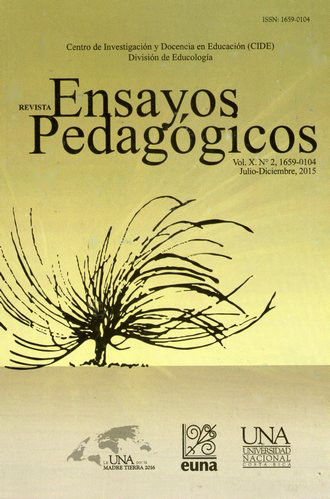Orientation of Human Capital through the Work Competency Approach in a Colombian Company
DOI:
https://doi.org/10.15359/rep.10-2.6Keywords:
human capital, enterprise, attitudes, behaviors, job training, job training strategiesAbstract
This study develops the concept of human capital taken as a symbol of value, making references to the importance of people in any organization. Here the great price that is in each one of the members of a company, the man at the center, who each of the parties revolve around in systemic pursuit of excellence are highlighted. Moreover, as the human capital increase their knowledge grows its potential. On the basis of all human capital are the attitudes; in these, people’s behaviors can be modified. Therefore, it is a very important commitment in the case of a head as it comes to play a significant role the inner world of human resources and their relationship with others. Therefore, this study develops a process that guides the human capital to Colombian businesses and foundations to propose strategies for skills development for employees and workers (traditional approaches, competency-based approaches); this leads us to analyze and identify the general basis on which rests the management of human capital in the Colombian company. The competency approach was used for the study, coordinating the various sources and forms of inquiry, from the environment to labor daily, starting from the logic of the actors involved, labor practice and management strategies human capital used in the Colombian company to reach a labor competency training strategies. Human capital management taking into account the competencies, conceived as a synthesis of practice and theory, is one of several options the modern world against the huge gap between formal education, schooling. From this perspective, human capital management must be conceived, as a program to ensure that the individual has the skills, abilities, knowledge, skills and experience requires a company to take specific charge process.
References
Bárcenas, E. (2010). Formación y Trabajo. Ediciones La Luz. Buenos Aires.
Cabezas, F. (2009). La Formación para el Trabajo en el Siglo XXI. Editora Cinco. Madrid.
Carrillo, J. (2010). Educación y Formación en Colombia. Ediciones Lumen. Bogotá.
Castañeda, L. (2010). Desarrollo del Capital Humano en América Latina. Editora el Dorsel. Caracas.
CINTERFOR/OIT. Boletín técnico interamericano de formación profesional. Competencias Laborales en la Formación Profesional. Montevideo, n.149, mayo-agosto 2000.
CINTERFOR/OIT. Formación y trabajo: de ayer para mañana. Montevideo, 1996. - Cinterfor/OIT. Formación y trabajo decente. Montevideo, 2000.
Durán, A. (2010). La Sociedad del Conocimiento: Reflexiones y Práctica. Editora Centauro. Caracas.
Ermida U. (2001). Trabajo decente y formación profesional. Montevideo: Cinterfor/OIT.
García, E. (2010). Competencias y trabajo: Procesos y funcionalidad. Ediciones Belgrano. Buenos Aires.
Hernández, R., Fernández, C. y Baptista, P. (2006): Metodología de la investigación. México: McGraw-Hill.
Leibowicz, J. (2000). Ante el imperativo del aprendizaje permanente, estrategias de formación continúa. Montevideo: Cinterfor/ OIT.
Manual para Diseñar Estructuras Curriculares y Módulos de Formación para el Desarrollo de Competencias en la Formación Profesional Integral”. Octubre de 2002.
Marin, W. (2010). Análisis Funcional y Competencias. Cuadernos. Ediciones Alvarado. Lima.
Peña, E. (2010). Las competencias laborales, análisis y desarrollo. Cuadernos. Ediciones Sócrates. Santiago de Chile.
Serrato, E. (2010). Capital humano y Formación. Editora La Fuente. Barcelona, España.
Sierra, Dolores. La Educación: Base del desarrollo y el crecimiento. Editora Belmira. Buenos Aires. 2010.
Smills, G. (2010). Educación en Competencias. Prentice- Hall. México.
Solarte, G. (2010). La Formación, dilema para el Desarrollo. Ediciones Consuegra. Caracas.
Suarez, E. (2005). Cuadernos y folios. Ediciones Latinas. Santa Fe de Bogotá.
Sánchez, J. (2001). Aprendizaje visible, Tecnología invisible. Santiago de Chile: Ediciones Dolmen.
Tamayo, M. (2005). El Proceso de la Investigación Científica: incluye evaluación y administración de proyectos de investigación. México: Limusa.
Torres, E. (2010). Desarrollo de los procesos de Formación en Competencias. Editora Sumen. Buenos Aires.
UNAB. El Enfoque de Competencia Laboral. Cuadernos, Bucaramanga. 2005.
Zampudio, E. (2003). Un panorama sobre las competencias a nivel mundial. Editorial Temis. Santa Fe de Bogotá.
Zampudio, E (2010). Nuevas metodologías para la Formación Laboral. Ediciones La Espada. Madrid.
Zarifian, P. (2000). El modelo de competencia y los sistemas productivos. Montevideo: Cinterfor/OIT.
Downloads
Published
How to Cite
Issue
Section
License
Ensayos Pedagógicos is subscribed to the Attribution-NonCommertial-NoDerivatives 4.0 International Creative Commons Licence, which allows both authors and readers to freely download, store, copy, and distribute the final approved publisehd version of the manuscript (post-print) as long as this is done without commercial purposes, no derivative works are generated, and the source and author are mentioned. As well, Ensayos Pedagógicos declares that authors will remain the rightful owners of the copyrights of their work in perpetuity.







